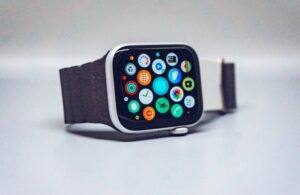
Blooomberg reported that the company has a “moonshot-style” project in the works, according to “sources familiar with the matter.” The report said the tech giant still has years ahead in this development of the technology, which wouldn’t penetrate the skin.
The initial technology, per the report, comes in the form of a prototype device (around the size of an iPhone) strapped to the bicep. Bloomberg says Apple’s overall goal remains to bring this technology to the Apple Watch.
However, such an offering could change the landscape of a market dominated by technology that users insert into their skin. Fingersticks — needles for pricking blood samples to measure glucose levels — were, for a long time, the standard.
Dexcom and Abbott develop their CGMs — the G7 and FreeStyle Libre 3 representing the most recent innovations — that users insert and replace after a set amount of days (10 and 14 days, respectively). Shares of both companies dipped slightly on the back of the news, first reported on Wednesday.
Bloomberg said Apple aims to use chip-based silicon photonics and optical absorption spectroscopy to measure glucose levels. Per the report, this method emits light below the skin. The light reaches interstitial fluid that can be absorbed by glucose and reflects back to the sensor, indicating the glucose concentration. Apple’s algorithm then establishes a blood glucose reading.
According to the report, Apple’s project goes back more than 12 years. The company tested the glucose technology on “hundreds of people,” Bloomberg said. That includes human trials of those who don’t know if they’re diabetic, plus those with prediabetes and type 2 diabetes. These tests compared the technology to fingersticks, the report noted.
Apple continues its play in the healthcare space
A massive company known for its phones, tablets and more, Apple’s move toward the medtech market is no secret.
Apple Watch, in particular, represents a major asset in the space, given that it’s worn on the body and tracks the user’s health metrics.
Many companies have worked to integrate their own technologies with Apple’s, but the company itself continues to innovate. In 2021, the FDA cleared the company’s irregular heart rhythm notification on the Apple Watch. The technology identifies episodes of irregular heart rhythms consistent with AFib.
However, longstanding medtech companies have fought back against Apple’s foray into the territory. AliveCor and Masimo both have patent disputes ongoing against the tech giant over the Apple Watch heart monitoring function.
This week, the final determination rule on AliveCor’s patent dispute with Apple cleared presidential review. In December, the International Trade Commission (ITC) ruled that the Apple Watch infringed AliveCor’s patented technology. AliveCor still has an ongoing appeal of a U.S. Patent Trial and Appeal Board decision that favored Apple.
Last month, a U.S. Administrative Law Judge in Washington, D.C. ruled in favor of Masimo in its dispute. The U.S. ITC must now consider whether to implement an import ban on Apple Watches.
